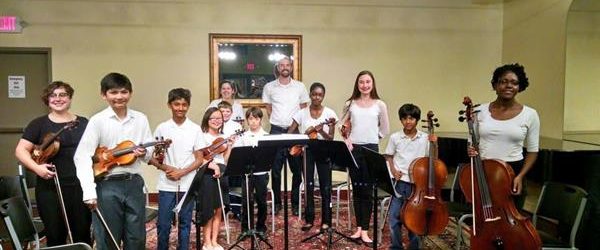Does my child have talent? With Suzuki, the answer is always “Yes!”
Learn why our families love it, and why it works so well!
The CMA Strings, Guitar, and Piano departments offer lessons using the Suzuki Method, a philosophy built on how children learn most naturally. Here, we highlight the key elements and what Suzuki students (and families) can expect.
The Suzuki Method, at a glance
Originated by Dr. Shinichi Suzuki more than 60 years ago, this educational philosophy is also known as Talent Education. Dr. Suzuki believed every person is able to develop skill and ability through daily practice and listening. In short: talent is not born, but developed. (You may be surprised to discover how many musicians got their start with Suzuki!)
The core elements are simple: daily listening, practice and review, and a supportive community. Each element is important, as they mirror the way we first learn to speak – through frequent exposure and practice. We know that learning to speak a language is incredibly complex and difficult, and yet, children learn to speak fluently and find motivation in the process.
Dr. Suzuki applied this approach to the language of music. As a result, we see children engaged in learning, making great progress, and who enjoy making music together. As a side benefit, they develop discipline, focus, listening and communication skills.
What can I expect?
In general, we work with students and families to create a nurturing environment where music is experienced daily and there are frequent opportunities to connect with others in the CMA Suzuki Community. More specifically, the Suzuki experience includes
- Weekly individual lessons with your primary teacher. Parents attend lessons and take an active role as an at-home practice partner
- Regular group classes (strings only, weekly or biweekly, depending on level) that bring together students working on the same pieces to “converse” through music in a lively and enjoyable environment
- Collaboration with their teacher and “practice partner” (usually a parent) to set weekly practice plans and long term goals.
- Several solo and group performance opportunities throughout the year.
The emphasis on having a home practice partner, frequent listening, group classes and progressive repertoire are key features of Suzuki, and often different from “traditional” music lessons. Here’s a bit more on each:
Parental / Practice Partner Involvement
Practice Partners play an important role in Suzuki lessons. They attend weekly lessons and are the link between private lessons and home practice. Practice partners are “home teachers”. They help during practice, making sure that what was learned in private lessons is reinforced during the week. Teachers work with practice partners during the lesson to ensure that parents feel equipped to take on this important role.
Exposure and Listening
Daily listening is the most important tool when learning a new language. Suzuki students improve their ability by spending time listening to the Suzuki repertoire and are encouraged to listen to other repertoire to gain a broader understanding of music.
Group Classes
When a child learns language, they spend time interacting with others and trying to form sounds and words. Children learn by trying and refining their ability, especially when with their peers. Seeing people they relate to working similarly provides context and builds confidence by showing each child that other children have successes and struggles, just as they do. Group classes are a fundamental component of Suzuki education. Group classes motivate and expose kids to their own potential.
Repetition and Progressive Repertoire
The Suzuki method builds new skills upon the foundation of pieces that have been already learned. This too is mirrors language learning. Starting with a few words we build increasingly complex sentences and thoughts. The Suzuki repertoire is designed to be progressive, building upon itself. Students learn new concepts through exercises based on their repertoire. Suzuki students share a repertoire, so they can play with other Suzuki students across the world, making music an even more universal language.
Join us!
Strings Contact – Greg Noland strings@cincinnatimusicacademy.com. You are also welcome to observe a group class or concert.
Guitar Contact – Joel Greenberg guitar@cincinnatimusicacademy.com
Piano Contact – Natasha Pence piano@cincinnatimusicacademy.com

